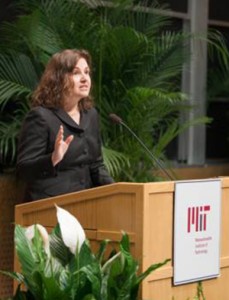Boosting Cybersecurity: MIT Attacks on Three Fronts
-
-
slice.mit.edu
- 1
Filed Under
Recommended

Cybersecurity is a topic that MIT has been addressing since the 60s, before personal computers were even on the market. Today, as security breaches threaten both personal and professional networks, MIT has announced plans to address the problem from three angles: technology, public policy, and organizational management.
Computer Science and Artificial Intelligence Laboratory (CSAIL) Director Daniela Rus answered a few questions for Slice of MIT about the new initiatives:
What expertise can MIT offer for these programs?
One of MIT’s first efforts in cybersecurity was developing time-sharing computers in the 60s that could be used by multiple people at once. As soon as this system was developed, they knew that they also needed to think critically about the necessary infrastructure to keep users' information safe. In fact, since different users had to sign in and out of the system, by many accounts MIT is credited as being ground-zero for the world's first-ever computer password.
More recently, conversations with various researchers in our lab further solidified the realization that we can bring a lot of concentrated thought leadership to this area of study, and that it therefore is deserving of its own initiatives.
What are the distinctions between the different programs?

The three initiatives are aimed at tackling the technical, regulatory, and business aspects of cybersecurity.
1. Cybersecurity@CSAIL, led by Dr. Howard Shrobe, brings together experts in software, hardware, cryptography, and other fields to address the technical challenges associated with preventing, working through, and recovering from web-based attacks.
2. The MIT Cybersecurity and Internet Policy Research Initiative, an interdisciplinary program funded by a $15 million grant from the Hewlett Foundation and led by CSAIL principal investigator Daniel Weitzner (former U.S. Deputy Chief Technology Officer for Internet Policy in the White House), draws researchers from across MIT to create the foundations for smart, sustainable cybersecurity policy.
3. The Interdisciplinary Consortium for Improving Critical Infrastructure Cybersecurity, (IC)3, a new consortium based at the MIT Sloan School of Management and led by Professor Stuart Madnick, will address the need to improve the cybersecurity of critical infrastructure through a focus on the strategic, managerial, and operational issues related to cybersecurity.
How will CSAIL work with other departments on these initiatives?
There will be close collaboration between CSAIL and other centers and departments at MIT.
Industry members of Cybersecurity@CSAIL and (IC)3 can attend the annual meetings of both initiatives and will also get access to joint-networking events and access to an exclusive online repository of relevant research.
The policy initiative, meanwhile, will involve individuals from all over campus, including political scientists, economists, cryptographers, and engineers.
We hope that these initiatives will help us work together with industry to create better tools to eliminate a lot of the current vulnerabilities that plague the digital landscape and to have some more substantive discussions about what can be done in terms of better technology policy.
Read the full article on MIT News.








Comments
Bruce Mendelsohn
Thu, 03/19/2015 12:29pm
There's a fourth leg to this chair, and it is in keeping with MIT's rich tradition of making available to the broader world our knowledge, skills and expertise in the fields of science, technology, engineering, and--in this particular case--cybersecurity.
To wit: This June 22-23 here on campus, MIT Professional Education's Short Program will offer a course entitled "Applied Cyber Security".
Delivering this course will be John R. Williams (MIT Professor of Information Engineering, Civil and Environmental Engineering, and Engineering Systems Director); Abel Sanchez, (Executive Director, Research Scientist, MIT Laboratory for Manufacturing and Productivity); Joe Provost (Cyber Systems Analysis, MIT Lincoln Lab); and other academic and industry cybersecurity professionals from throughout the world.